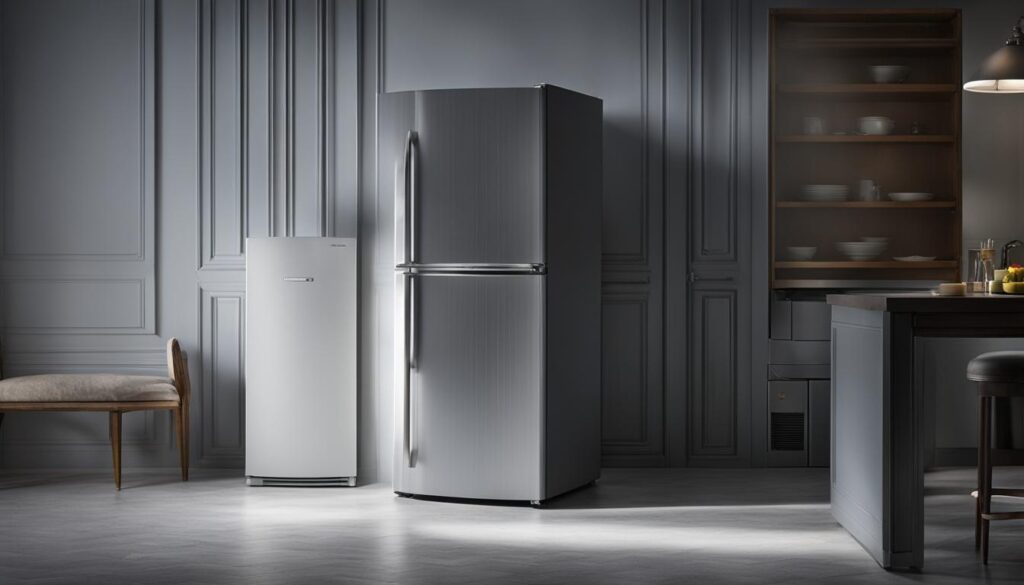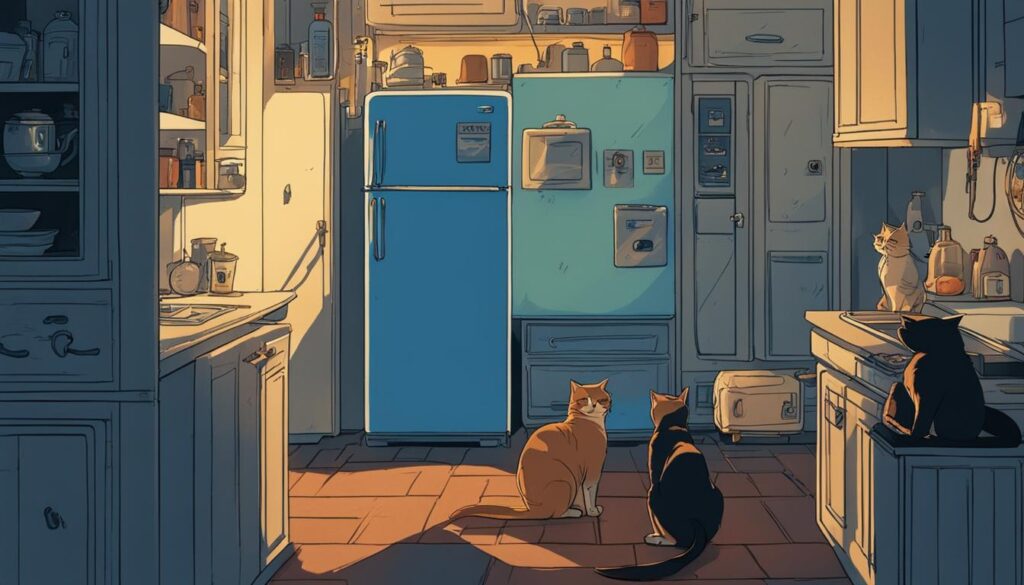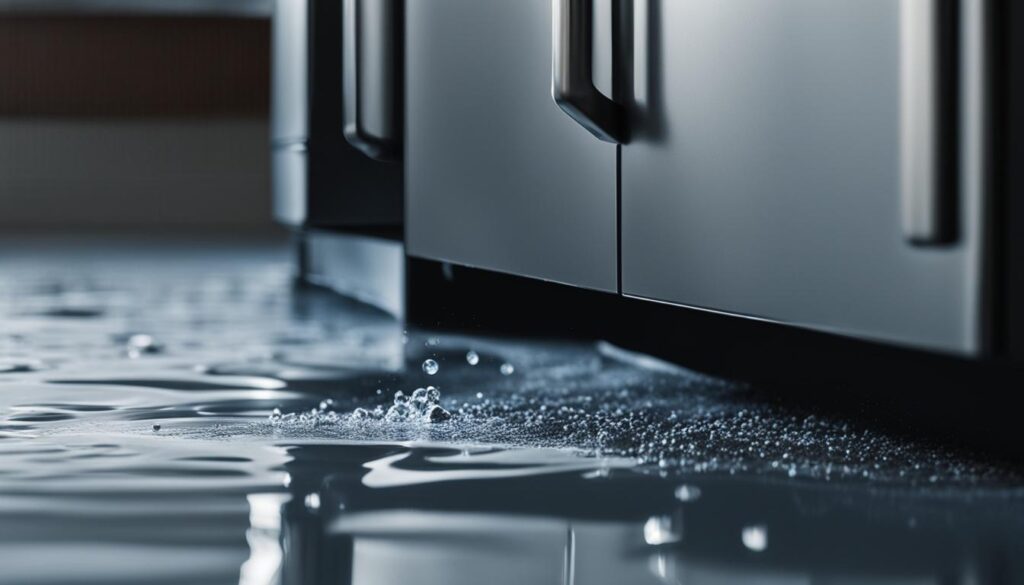
Welcome to our guide on common fridge problems and how to troubleshoot them. We know how essential a well-functioning fridge is in keeping our food fresh and healthy. However, just like any other appliance, fridges can encounter issues that can cause inconvenience and frustration. Luckily, most of these issues are easy to fix with the right knowledge and tools. In this section, we will discuss some of the most common fridge problems and provide you with practical troubleshooting tips to help you resolve them.
If your refrigerator is not cooling as it should, it can be frustrating and concerning. The good news is that there are several things you can troubleshoot to resolve the issue.
The first thing to check is the thermostat. Make sure that it is set to the appropriate temperature and that it is functioning correctly. If the thermostat is not working properly, it can cause problems with the cooling.
Dirty condenser coils can also cause cooling issues in your refrigerator. If they are covered in dust or debris, they cannot release heat properly, making it difficult for the refrigerator to maintain a consistent temperature. To clean the condenser coils, unplug the fridge, locate the coils (usually found on the back or underside of the unit), and clean them with a vacuum cleaner or brush.
If the condenser coils are clean and the thermostat is functioning properly, the next thing to check is the cooling fan. A faulty fan can cause problems with cooling. To troubleshoot this, listen for a humming sound when the fan should be running. If you don’t hear anything, or if the fan is not spinning, it may need to be replaced.
Finally, check the temperature settings in your fridge. If they are too high, your refrigerator will not cool properly. Make sure your fridge is set to the manufacturer’s recommended temperature settings.
By following these simple troubleshooting steps, you can diagnose and fix the most common cooling issues with your refrigerator. If the problem persists, it may be time to call in a professional for assistance.

If you’ve ever wondered why your fridge is making strange noises, you’re not alone. Strange fridge noises can be alarming, but they’re typically indicative of a minor problem that can be fixed with a little troubleshooting. Here are a few potential causes of strange noises and what you can do to address them.
One of the most common sources of strange fridge noises is a faulty evaporator fan motor. This motor is responsible for circulating air throughout your fridge to keep your food fresh. If you hear a high-pitched whistling or squealing noise, this could be a sign that the fan motor is malfunctioning.
To troubleshoot this issue, unplug your fridge and remove the back panel to access the evaporator fan motor. Check to see if the blades are obstructed by any debris or if they’re loose. If everything looks okay, the fan motor itself may be faulty and will need to be replaced.
If your fridge is making gurgling or bubbling noises, this could indicate a clogged drain tube. This tube is responsible for draining excess water from your fridge during the defrost cycle. Over time, debris can accumulate in the tube, causing it to become clogged and resulting in strange noises.
To troubleshoot this issue, locate the drain tube (usually found at the back of your fridge) and use a pipe cleaner or similar tool to remove any blockages. Once you’ve cleared the tube, pour a mixture of warm water and baking soda down the tube to help keep it clear in the future.
If you hear rattling or vibrating noises coming from your fridge, this could be a sign that some parts have come loose. Check the shelves, drawers, and other components to see if anything is loose or improperly positioned. If you find any loose parts, tighten them up or reposition them as necessary.
Noisy refrigerators can certainly be a nuisance, but with a little troubleshooting, you can usually identify and address the issue. By taking the time to diagnose the problem, you can ensure that your fridge stays in good working order for years to come.

Dealing with a leaking fridge or water accumulation inside can be a headache for any Canadian homeowner. Fortunately, we’ve got you covered with practical troubleshooting tips to help address this frustrating issue.
The first step in resolving a leaking fridge is to identify the source of the problem. Check if the water is coming from the fridge itself or from the surrounding area. If it’s coming from the fridge, examine the water supply lines and filters, as they may be damaged or improperly connected. You can also inspect the defrost drain hose which might be blocked, causing water accumulation to occur.

If water is pooling around the base of the fridge, check for a clogged drain pan or a malfunctioning water dispenser. Inspect the condenser coils, which may be dirty and causing excess water that cannot be evaporated.
If you find that the water is coming from the fridge itself, there are several things you can do to fix the issue. First, check the water supply lines and filters for any damage. Replace them if necessary, ensuring a secure connection. You can also try defrosting the evaporator coil to remove any ice buildup that may be preventing the defrost drain from working properly. Additionally, ensure proper temperature settings are used so as not to cause any ice formation in the unit.
If the water is pooling around the fridge, check the drain pan for any clogging or holes. Replacing damaged parts or cleaning the clogged tubes may help. If the problem persists, consider hiring a professional to inspect your fridge and appliance components.
Don’t let water problems get the best of your fridge. Use these practical tips to help restore your fridge’s functionality and keep it cooling efficiently for years to come.
Freezers are a vital part of any fridge, but they can cause problems when they start overheating or accumulating excessive ice. Overheating can cause your freezer to run excessively, raising electricity bills and shortening your fridge’s lifespan. Excessive ice buildup can affect the efficiency of your freezer which in turn can cause it to work harder, potentially leading to more overheating and even freezer burn on your frozen goods.
If your freezer is overheating, it could be an issue with the thermostat. Make sure it’s set at the right temperature and that it’s not in contact with other objects, which could interfere with its ability to accurately read the temperature. If the thermostat isn’t working properly, it may need to be replaced.
If you notice ice buildup in your freezer, the drainage system may be blocked. Clear the drainage hole with hot water and a pipe cleaner to ensure proper drainage. Keep in mind that excessive ice buildup can also be caused by leaving the freezer door open for too long or too frequently. Make sure the door is always properly closed and that the seal is tight.
If the freezer has overheated, unplug it and let it cool down for a few hours before plugging it back in. Overloading the freezer with too many items or not leaving enough room for air circulation can cause overheating. Ensure adequate space for air circulation around the freezer and reduce the amount of food stored in it as necessary.
By following these simple troubleshooting steps, you can resolve freezing problems in your fridge and prevent costly repairs. Remember, if the problem persists, it may be time to call in a professional fridge repair technician.
Common fridge problems include refrigerator not cooling properly, strange noises, leaking or water accumulation, and freezer overheating or ice buildup. To troubleshoot these issues, refer to the respective sections below for detailed troubleshooting tips and solutions.
If your refrigerator is not cooling as it should, there could be several possible causes. Some common issues include a faulty thermostat, dirty condenser coils, and improper temperature settings. Refer to the “Refrigerator Not Cooling Properly” section below for step-by-step troubleshooting instructions.
Strange noises coming from your fridge can be a cause for concern. These noises could be due to a faulty evaporator fan motor or a clogged drain tube. To identify and resolve the source of the noise, refer to the “Strange Noises Coming from the Fridge” section below for practical tips and solutions.
If you’re dealing with a leaking fridge or water accumulation inside, there are a few potential culprits to consider. A blocked defrost drain or a malfunctioning water dispenser could be causing the issue. Refer to the “Leaking or Water Accumulation in the Fridge” section below for troubleshooting steps to identify and fix these problems.
Freezer overheating or excessive ice buildup can be frustrating, but there are steps you can take to address these issues. Refer to the “Freezer Overheating or Ice Buildup” section below for troubleshooting tips and solutions to ensure optimal freezer performance and longer-lasting food preservation.